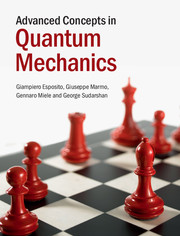Book contents
- Frontmatter
- Contents
- Preface
- 1 Introduction: the need for a quantum theory
- 2 Experimental foundations of quantum theory
- 3 Waves and particles
- 4 Schrödinger picture, Heisenberg picture and probabilistic aspects
- 5 Integrating the equations of motion
- 6 Elementary applications: one-dimensional problems
- 7 Elementary applications: multi-dimensional problems
- 8 Coherent states and related formalism
- 9 Introduction to spin
- 10 Symmetries in quantum mechanics
- 11 Approximation methods
- 11A Perturbation theory
- 11B Jeffreys–Wentzel–Kramers–Brillouin method
- 11C Scattering theory
- 12 Modern pictures of quantum mechanics
- 13 Formulations of quantum mechanics and their physical implications
- 14 Exam problems
- 15 Definitions of geometric concepts
- References
- Index
11A - Perturbation theory
Published online by Cambridge University Press: 05 November 2014
- Frontmatter
- Contents
- Preface
- 1 Introduction: the need for a quantum theory
- 2 Experimental foundations of quantum theory
- 3 Waves and particles
- 4 Schrödinger picture, Heisenberg picture and probabilistic aspects
- 5 Integrating the equations of motion
- 6 Elementary applications: one-dimensional problems
- 7 Elementary applications: multi-dimensional problems
- 8 Coherent states and related formalism
- 9 Introduction to spin
- 10 Symmetries in quantum mechanics
- 11 Approximation methods
- 11A Perturbation theory
- 11B Jeffreys–Wentzel–Kramers–Brillouin method
- 11C Scattering theory
- 12 Modern pictures of quantum mechanics
- 13 Formulations of quantum mechanics and their physical implications
- 14 Exam problems
- 15 Definitions of geometric concepts
- References
- Index
Summary
Approximation of eigen values and eigenvectors
Many realistic problems that arise in theoretical physics lead to equations which cannot be given exact general solutions. Therefore, many attempts have been made to produce satisfactory methods to provide approximate solutions. The most common ones search for solutions in terms of power series and in terms of asymptotic expansions. The main idea behind approximation methods is to try to find approximate solutions of a given system by means of exact solutions of an approximate system (a ‘nearby’ system). We start with the eigenvalue equation associated with the Hamiltonian H and consider an approximating one, say H0, whose equations of motion can be explicitly solved. We introduce an interpolating family of Hamiltonians Hε = H0 + εH1 such that, for a given value of ε, say ε, Hε ≡ H. Both eigenvalues and eigenvectors for Hε may be expanded as a series in ε and solved order by order. The simplest example to illustrate what we have in mind is provided by a second-order algebraic equation, e.g.
x2 − 3.03x + 2.02 = 0.
This equation may be written by means of an interpolating family
x2 − 3(1 + ε)x + 2(1 + ε) = 0,
which yields the equation we want to solve when ε = 10−2. One can consider the approximate equation to be given by ε = 0, i.e.
x2 − 3x + 2 = 0.
- Type
- Chapter
- Information
- Advanced Concepts in Quantum Mechanics , pp. 235 - 273Publisher: Cambridge University PressPrint publication year: 2014



